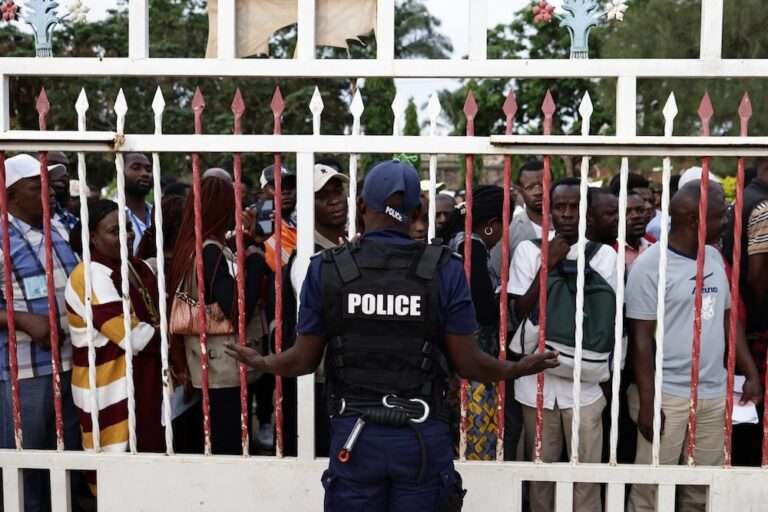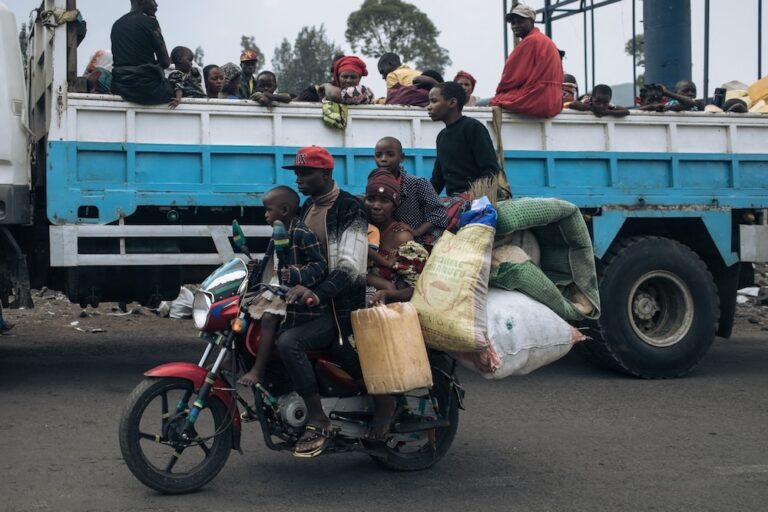The ongoing interference by politicians and security agents in the realm of the media reflect the failure of the CSAC to protect the right to information, says JED.
(JED/IFEX) – 28 December 2011 – Journaliste en Danger (JED) calls upon the powers that be to halt the escalating repression of the media since the beginning of the crisis that has taken place in the country following the 28 November presidential elections.
The following is a round-up of some of recent cases of media repression:
– In East Kasai, Radio Kibungie, a station broadcasting in Kabinda, was suspended from broadcasting on 17 December by Paul Djonga and Bovic Ngefo, district commissioner and local director of the national intelligence agency (ANR), respectively, on “security” grounds. An arrest warrant was issued against Toto Kasongo, director of the radio station, who consequently had to go underground. In its broadcasts, Radio Kibungie denounced acts of fraud that were occurring in the local centre of the National Independent Electoral Commission (CENI).
– Also in East Kasai, the office of Radio Télévision Nationale Congolaise (RTNC), the local station in Lodja, was ransacked on 19 December by supporters of a parliamentary candidate, who accused the station of criticizing their leader.
– Radio Télévision Débout Kasaï (RTDK), a channel broadcasting in Mbuji-Mayi, was attacked on 23 December at approximately 6 p.m. by an armed commando of six individuals in civilian clothing. The soldiers used live ammunition and teargas to enter the premises. Adolpe Tshikala, a journalist who was inside the premises, was arrested and taken to a holding cell of the ANR, where he spent four days before being sent to the Public Prosecutor’s Office on 27 December.
– Kleber Kadiediem, the director of Kasaï Horizon Radio Télévision (KHRT), was attacked on 23 December by members of the police force who threatened to shoot him. The journalist was accused of having commented on the BBC regarding the absence of foreign Heads of State at the swearing-in of President Kabila.
– Mathieu Kamango, a journalist at Télé 50, a station with close links to the presidential party was violently attacked on 23 December by members of the military police close to the Martyr’s Square, where Étienne Tshisekedi had pronounced himself president of the republic. Kamango was taken to the Kokolo military base where he was severely beaten and held for over five hours. Kamango’s belongings were taken away and he received death threats.
– Thomas Hubert, a correspondent with BBC Africa in Kinshasa, had his journalistic equipment confiscated on 23 December by an officer of the Republican Guard while he was reporting on a statement made by Etienne Tshisekedi. His equipment was later returned to him, but the audio recording had been deleted.
– In eastern Kasai, Radio Veritas, a community station, was shuttered on 24 December by Paul Djonga and Bovic Ngefo, district commissioner and local director of the national intelligence agency (ANR) respectively, on the grounds that it was “insulting to the Head of State.” In its newspaper, Radio Veritas had published an article discussing the presence of two presidents in the country and proposed that a third person, other than Kabila and Tshisekedi, should rule the country. The two journalists who wrote the piece were summoned and questioned regarding the article. The director of the station was also asked to sanction the journalists, a request he categorically refused to carry out.
– Célestin Kashala, the director of Radio Banhu, was arrested on 24 December following a complaint lodged by Dominique Nsimbi, president of the local branch of the People’s Party for Reconstruction and Democracy (PPRD). Kashala is still in detention. Radio Bangu was accused of “inciting the population to revolt” through the dissemination of information relating to Etienne Tshisekedi’s statement. Kashala has denied this accusation, stating that “to be on the safe side, we suspended the publication of the newspapers in question in order to avoid such accusations.”
In JED’s opinion, the multiple and ongoing interferences by politicians and security agents in the realm of the media, in violation of the prerogatives of the High Council for Broadcasting and Communications (CSAC), reflect the failure of this regulatory body to protect the right to information and to promote professionalism in the media.
In the face of the CSAC’s inability to be independent, thereby endangering freedom of expression and a free press, JED calls upon the Head of State to dissolve the CSAC and to establish a more credible and competent organisation to replace it.
Please note that this is an abridged translation.


